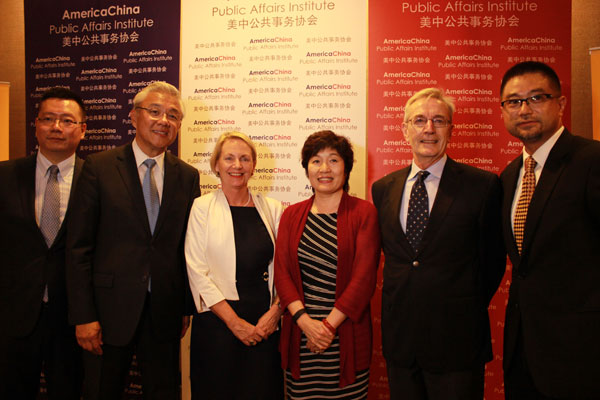Film honors Shanghai's role in sheltering Jews
Updated: 2015-09-09 15:49
By LI JING(China Daily USA)
|
|||||||||||
 |
|
Zhang Qiyue, China's consul general (in red), attends screening of Shanghai Ghetto at Cinema 123 in New York on Tuesday with (from left) Eric Yuan of the America China Public Affairs Institute; Fred Teng, institute president; Kerry Minchin; her husband Nick Minchin, Australia consul general in New York; and Alan Way of the institute. Li Jing / China daily |
The international community needs to know more about China's contributions and sacrifices in the war against fascism, said China's consul general in New York.
"People in the world, including people here in New York, know about the history of World War II and the Holocaust, while few know that more European Jews had taken refuge in Shanghai than in any other city in the world, when war broke out in 1939," Zhang Qiyue, China's consul general in New York, said at the screening of the 2002 documentary film Shanghai Ghetto at Cinemas 123 in New York on Tuesday night. "The screening of the film, as well as the exhibition and books on the history will allow people to know about the history."
The film was shown to mark the 70th anniversary of World War II's end and organized by the America China Public Affairs Institute, an independent research organization specializing in US-China affairs.
Zhang said that from 1933 to 1942, Shanghai accepted more than 30,000 Jewish refugees and hosted a large, vibrant community fleeing persecution in Europe.
"We remember history to call for peace in the future," Zhang said. "Relations between the United States and China are the key to global stability, and to strengthen China-US relations and to foster good relations is to preserve peace and stability and to preserve prosperity."
In the late 1930s, German Jews were trying to escape Nazi persecution, but country after country closed its doors to them. The only place in the world that didn't require entrance visas was the international city of Shanghai.
Most of them were relocated in an area of approximately one square mile in the Hongkou district of Japanese-occupied Shanghai, known as the Restricted Sector for Stateless Refugees, or Shanghai Ghetto.
Against odds such as language barriers, poverty, rampant disease and isolation, the refugees were able to make the transition from being supported by welfare agencies to establishing a functioning community.
Jewish cultural life flourished: Schools were established, newspapers were published, theaters produced plays, and sports teams played.
"The fact that China was pleased with Jews and accepted refugees at the time when Jews were not welcome anywhere is very important for China-Israel relations," said Amir Sagie, deputy consul general of Israel in New York.
He said China was never anti-Semitic, neither a century ago or in modern times. "This is the fundamental part of our relations with China, and we cherish very much the memories," Sagie said.
Seth Mitchell Siegel, an American writer and author of Let There Be Water: Israel's Solution for a Water-Starved World, said he was aware of the history of Jewish refugees in Shanghai because some of his friends' families lived there.
"The history sounds very extraordinary," Siegel said. "I think China is one of the greatest countries in the world. It is an important story to tell about how China accepted and warmly welcomed people who were in need," he said.
The feature-length documentary, narrated by Academy Award-winner Martin Landau, contains interviews with survivors and historians, rare letters, stock footage, still photos and images in modern Shanghai, where most of the Jewish ghetto remains unchanged.
The film tells of their relationships with the local Chinese and with the occupying Japanese Army; the attempts of the American Jewish community to help the refugees, the rich cultural life they constructed under great hardship, and the tragedy of their relatives who stayed behind in Europe.
lijing2009@chinadaily.com.cn
Today's Top News
Queen Elizabeth II surpasses Queen Victoria's long reign
China aims to be first to land on far side of moon
Renowned scroll painting unrolled at the Palace Museum
Chinese premier Li commends nation's teachers
China celebrates 50th anniversary of Tibet
Russian life captured in photos
China scraps dividend tax for long-term investors
From Kansas to Copenhagen: clean energy beacons around the world
Hot Topics
Lunar probe , China growth forecasts, Emission rules get tougher, China seen through 'colored lens', International board,
Editor's Picks

|

|

|

|

|

|






